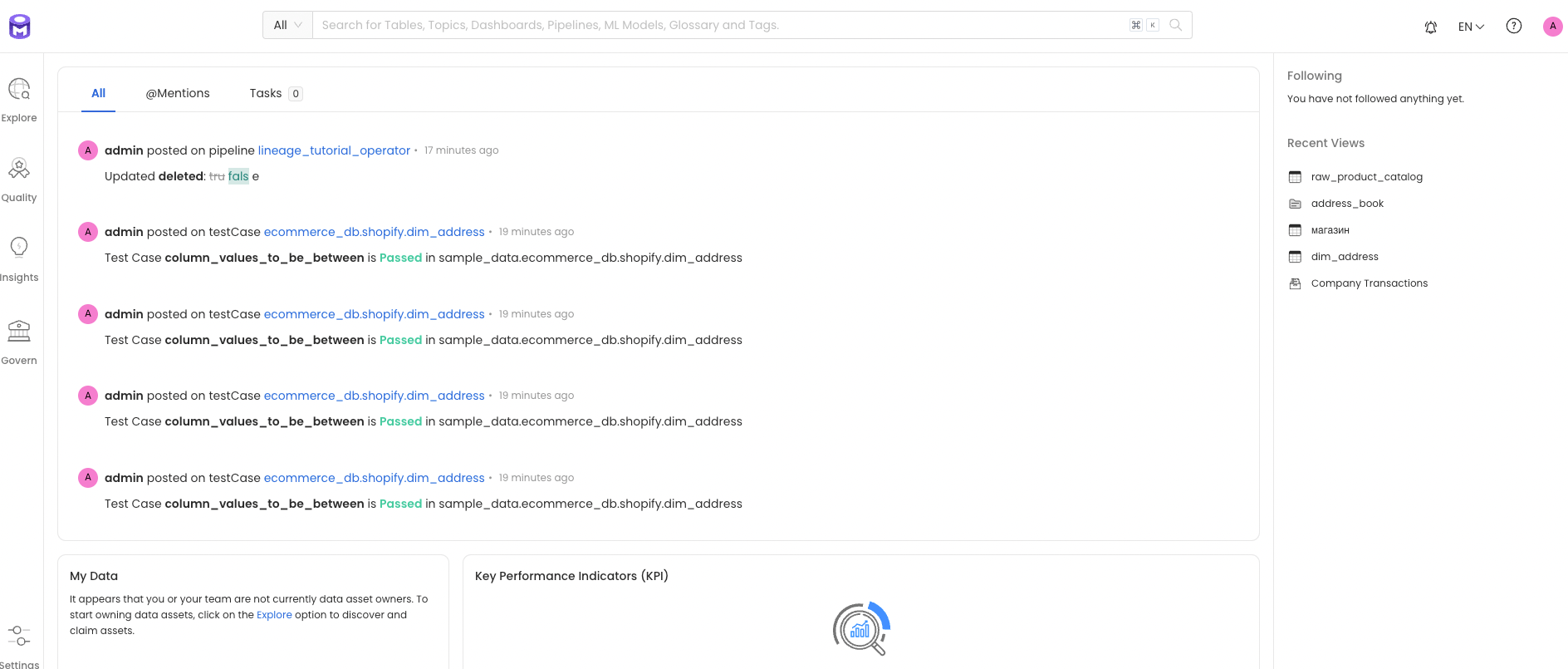OpenMetadata Source
Info
Generating data based on an external metadata source is a paid feature. Try the free trial here.
Creating a data generator for a JSON file based on metadata stored in OpenMetadata.
Requirements
- 10 minutes
- Git
- Gradle
- Docker
Get Started
First, we will clone the data-caterer-example repo which will already have the base project setup required.
git clone git@github.com:data-catering/data-caterer-example.git
OpenMetadata Setup
You can follow the local docker setup found here to help with setting up OpenMetadata in your local environment.
If that page becomes outdated or the link doesn't work, below are the commands I used to run it:
mkdir openmetadata-docker && cd openmetadata-docker
curl -sL https://github.com/open-metadata/OpenMetadata/releases/download/1.2.0-release/docker-compose.yml > docker-compose.yml
docker compose -f docker-compose.yml up --detach
Check that the following url works and login with admin:admin. Then you should see some data
like below:

Plan Setup
Create a new Java or Scala class.
- Java:
src/main/java/io/github/datacatering/plan/MyAdvancedOpenMetadataSourceJavaPlanRun.java - Scala:
src/main/scala/io/github/datacatering/plan/MyAdvancedOpenMetadataSourcePlanRun.scala
Make sure your class extends PlanRun.
import io.github.datacatering.datacaterer.java.api.PlanRun;
...
public class MyAdvancedOpenMetadataSourceJavaPlanRun extends PlanRun {
{
var conf = configuration().enableGeneratePlanAndTasks(true)
.generatedReportsFolderPath("/opt/app/data/report");
}
}
import io.github.datacatering.datacaterer.api.PlanRun
...
class MyAdvancedOpenMetadataSourcePlanRun extends PlanRun {
val conf = configuration.enableGeneratePlanAndTasks(true)
.generatedReportsFolderPath("/opt/app/data/report")
}
We will enable generate plan and tasks so that we can read from external sources for metadata and save the reports under a folder we can easily access.
Schema
We can point the schema of a data source to our OpenMetadata instance. We will use a JSON data source so that we can show how nested data types are handled and how we could customise it.
Single Schema
import io.github.datacatering.datacaterer.api.model.Constants;
...
var jsonTask = json("my_json", "/opt/app/data/json", Map.of("saveMode", "overwrite"))
.schema(metadataSource().openMetadataJava(
"http://localhost:8585/api", //url
Constants.OPEN_METADATA_AUTH_TYPE_OPEN_METADATA(), //auth type
Map.of( //additional options (including auth options)
Constants.OPEN_METADATA_JWT_TOKEN(), "abc123", //get from settings/bots/ingestion-bot
Constants.OPEN_METADATA_TABLE_FQN(), "sample_data.ecommerce_db.shopify.raw_customer" //table fully qualified name
)
))
.count(count().records(10));
import io.github.datacatering.datacaterer.api.model.Constants.{OPEN_METADATA_AUTH_TYPE_OPEN_METADATA, OPEN_METADATA_JWT_TOKEN, OPEN_METADATA_TABLE_FQN, SAVE_MODE}
...
val jsonTask = json("my_json", "/opt/app/data/json", Map("saveMode" -> "overwrite"))
.schema(metadataSource.openMetadata(
"http://localhost:8585/api", //url
OPEN_METADATA_AUTH_TYPE_OPEN_METADATA, //auth type
Map( //additional options (including auth options)
OPEN_METADATA_JWT_TOKEN -> "abc123", //get from settings/bots/ingestion-bot
OPEN_METADATA_TABLE_FQN -> "sample_data.ecommerce_db.shopify.raw_customer" //table fully qualified name
)
))
.count(count.records(10))
The above defines that the schema will come from OpenMetadata, which is a type of metadata source that contains
information about schemas. Specifically, it points to the sample_data.ecommerce_db.shopify.raw_customer table. You
can check out the schema here to
see what it looks like.
Run
Let's try run and see what happens.
cd ..
./run.sh
#input class MyAdvancedOpenMetadataSourceJavaPlanRun or MyAdvancedOpenMetadataSourcePlanRun
#after completing
cat docker/sample/json/part-00000-*
It should look something like this.
{
"comments": "Mh6jqpD5e4M",
"creditcard": "6771839575926717",
"membership": "Za3wCQUl9E EJj712",
"orders": [
{
"product_id": "Aa6NG0hxfHVq",
"price": 16139,
"onsale": false,
"tax": 58134,
"weight": 40734,
"others": 45813,
"vendor": "Kh"
},
{
"product_id": "zbHBY ",
"price": 17903,
"onsale": false,
"tax": 39526,
"weight": 9346,
"others": 52035,
"vendor": "jbkbnXAa"
},
{
"product_id": "5qs3gakppd7Nw5",
"price": 48731,
"onsale": true,
"tax": 81105,
"weight": 2004,
"others": 20465,
"vendor": "nozCDMSXRPH Ev"
},
{
"product_id": "CA6h17ANRwvb",
"price": 62102,
"onsale": true,
"tax": 96601,
"weight": 78849,
"others": 79453,
"vendor": " ihVXEJz7E2EFS"
}
],
"platform": "GLt9",
"preference": {
"key": "nmPmsPjg C",
"value": true
},
"shipping_address": [
{
"name": "Loren Bechtelar",
"street_address": "Suite 526 293 Rohan Road, Wunschshire, NE 25532",
"city": "South Norrisland",
"postcode": "56863"
}
],
"shipping_date": "2022-11-03",
"transaction_date": "2023-02-01",
"customer": {
"username": "lance.murphy",
"name": "Zane Brakus DVM",
"sex": "7HcAaPiO",
"address": "594 Loida Haven, Gilland, MA 26071",
"mail": "Un3fhbvK2rEbenIYdnq",
"birthdate": "2023-01-31"
}
}
Looks like we have some data now. But we can do better and add some enhancements to it.
Custom metadata
We can see from the data generated, that it isn't quite what we want. The metadata is not sufficient for us to produce production-like data yet. Let's try to add some enhancements to it.
Let's make the platform field a choice field that can only be a set of certain values and the nested
field customer.sex is also from a predefined set of values.
var jsonTask = json("my_json", "/opt/app/data/json", Map.of("saveMode", "overwrite"))
.schema(
metadata...
))
.schema(
field().name("platform").oneOf("website", "mobile"),
field().name("customer").schema(field().name("sex").oneOf("M", "F", "O"))
)
.count(count().records(10));
val jsonTask = json("my_json", "/opt/app/data/json", Map("saveMode" -> "overwrite"))
.schema(
metadata...
))
.schema(
field.name("platform").oneOf("website", "mobile"),
field.name("customer").schema(field.name("sex").oneOf("M", "F", "O"))
)
.count(count.records(10))
Let's test it out by running it again
./run.sh
#input class MyAdvancedMetadataSourceJavaPlanRun or MyAdvancedMetadataSourcePlanRun
cat docker/sample/json/part-00000-*
{
"comments": "vqbPUm",
"creditcard": "6304867705548636",
"membership": "GZ1xOnpZSUOKN",
"orders": [
{
"product_id": "rgOokDAv",
"price": 77367,
"onsale": false,
"tax": 61742,
"weight": 87855,
"others": 26857,
"vendor": "04XHR64ImMr9T"
}
],
"platform": "mobile",
"preference": {
"key": "IB5vNdWka",
"value": true
},
"shipping_address": [
{
"name": "Isiah Bins",
"street_address": "36512 Ross Spurs, Hillhaven, IA 18760",
"city": "Averymouth",
"postcode": "75818"
},
{
"name": "Scott Prohaska",
"street_address": "26573 Haley Ports, Dariusland, MS 90642",
"city": "Ashantimouth",
"postcode": "31792"
},
{
"name": "Rudolf Stamm",
"street_address": "Suite 878 0516 Danica Path, New Christiaport, ID 10525",
"city": "Doreathaport",
"postcode": "62497"
}
],
"shipping_date": "2023-08-24",
"transaction_date": "2023-02-01",
"customer": {
"username": "jolie.cremin",
"name": "Fay Klein",
"sex": "O",
"address": "Apt. 174 5084 Volkman Creek, Hillborough, PA 61959",
"mail": "BiTmzb7",
"birthdate": "2023-04-07"
}
}
Great! Now we have the ability to get schema information from an external source, add our own metadata and generate data.
Data validation
Another aspect of OpenMetadata that can be leveraged is the definition of data quality rules. These rules can be
incorporated into your Data Caterer job as well by enabling data validations via enableGenerateValidations in
configuration.
var conf = configuration().enableGeneratePlanAndTasks(true)
.enableGenerateValidations(true)
.generatedReportsFolderPath("/opt/app/data/report");
execute(conf, jsonTask);
val conf = configuration.enableGeneratePlanAndTasks(true)
.enableGenerateValidations(true)
.generatedReportsFolderPath("/opt/app/data/report")
execute(conf, jsonTask)
Check out the full example under AdvancedOpenMetadataSourcePlanRun in the example repo.